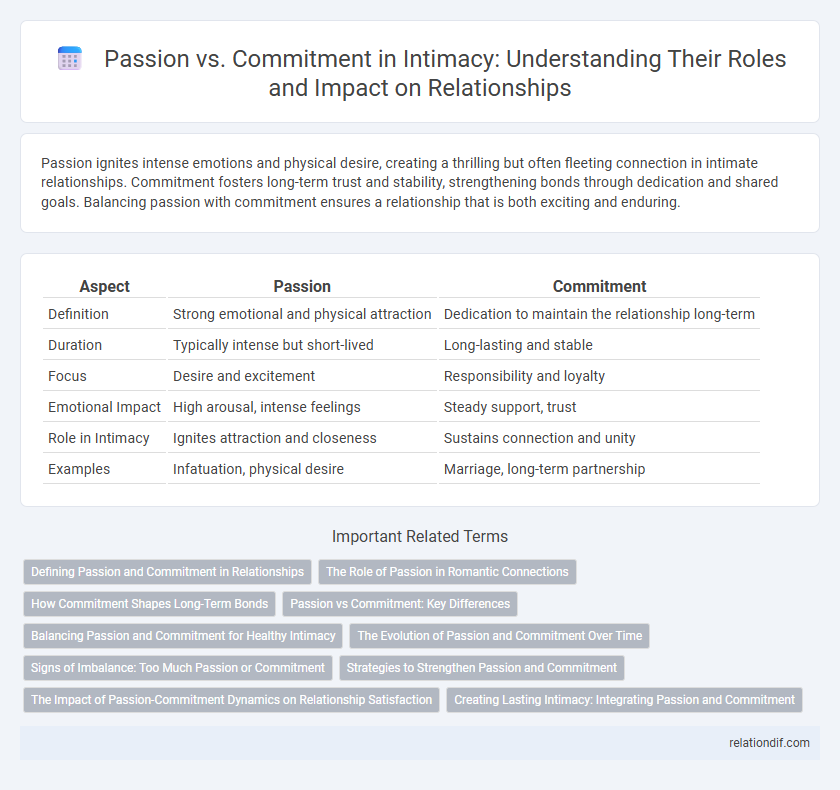Passion ignites intense emotions and physical desire, creating a thrilling but often fleeting connection in intimate relationships. Commitment fosters long-term trust and stability, strengthening bonds through dedication and shared goals. Balancing passion with commitment ensures a relationship that is both exciting and enduring.
Table of Comparison
| Aspect | Passion | Commitment |
|---|---|---|
| Definition | Strong emotional and physical attraction | Dedication to maintain the relationship long-term |
| Duration | Typically intense but short-lived | Long-lasting and stable |
| Focus | Desire and excitement | Responsibility and loyalty |
| Emotional Impact | High arousal, intense feelings | Steady support, trust |
| Role in Intimacy | Ignites attraction and closeness | Sustains connection and unity |
| Examples | Infatuation, physical desire | Marriage, long-term partnership |
Defining Passion and Commitment in Relationships
Passion in relationships is characterized by intense emotions, physical attraction, and a strong desire for closeness and connection. Commitment involves a conscious decision to maintain and nurture the relationship over time, fostering trust, loyalty, and long-term stability. Balancing passion and commitment creates a dynamic where emotional excitement coexists with dependable partnership, essential for lasting intimacy.
The Role of Passion in Romantic Connections
Passion ignites intense emotional and physical attraction, serving as the catalyst for romantic desire and excitement in intimate relationships. While passion fuels the initial stages of romance with powerful sensations and longing, its intensity often fluctuates over time compared to the steadiness of commitment. Understanding the role of passion helps partners navigate the balance between fiery connection and enduring dedication to sustain a healthy, fulfilling bond.
How Commitment Shapes Long-Term Bonds
Commitment strengthens long-term bonds by fostering trust, consistent support, and emotional security between partners. This dedication promotes stability, enabling couples to navigate challenges and grow together over time. Unlike fleeting passion, commitment sustains intimacy by prioritizing shared goals and mutual respect.
Passion vs Commitment: Key Differences
Passion in intimacy involves intense emotional and physical attraction, driving desire and excitement in relationships. Commitment refers to the decision to maintain and nurture a long-term bond, emphasizing loyalty, trust, and stability. Understanding the key differences between passion and commitment helps partners balance immediate gratification with sustained relationship growth.
Balancing Passion and Commitment for Healthy Intimacy
Balancing passion and commitment is essential for maintaining healthy intimacy, as passion fuels emotional and physical attraction while commitment ensures long-term stability and trust. Couples who nurture both elements create a dynamic relationship that supports growth, mutual respect, and deep connection. Prioritizing open communication and shared goals helps harmonize intense feelings with dependable partnership.
The Evolution of Passion and Commitment Over Time
Passion in relationships often peaks during the initial stages, characterized by intense physical attraction and emotional excitement, but tends to fluctuate as couples adapt to each other's habits and life changes. Commitment, however, typically strengthens over time, built on trust, shared goals, and mutual support, creating a solid foundation for long-term intimacy. Understanding the natural evolution of passion and commitment helps couples nurture both elements to sustain a balanced and fulfilling relationship.
Signs of Imbalance: Too Much Passion or Commitment
Excessive passion in a relationship often leads to impulsive decisions, emotional volatility, and neglect of long-term stability, while an overemphasis on commitment can result in stagnation, suppression of individual desires, and emotional disconnect. Signs of imbalance include frequent conflicts fueled by intense emotions or feelings of resentment due to unfulfilled personal needs. A healthy intimacy dynamic requires aligning intense affection with steady dedication to foster mutual growth and satisfaction.
Strategies to Strengthen Passion and Commitment
Strategies to strengthen passion and commitment include prioritizing open communication and expressing appreciation regularly to deepen emotional bonds. Engaging in shared experiences and maintaining physical intimacy fosters connection and rekindles desire. Setting mutual goals and supporting personal growth solidify trust and long-term dedication within relationships.
The Impact of Passion-Commitment Dynamics on Relationship Satisfaction
Passion and commitment interplay crucially shapes relationship satisfaction, with balanced dynamics fostering deeper emotional connection and stability. High passion coupled with strong commitment enhances intimacy and long-term fulfillment, while imbalances can lead to dissatisfaction or instability. Understanding the nuances of passion-commitment dynamics allows couples to cultivate lasting, satisfying relationships.
Creating Lasting Intimacy: Integrating Passion and Commitment
Creating lasting intimacy requires balancing passionate intensity with unwavering commitment, fostering emotional depth and sustained connection. Passion fuels desire and excitement, while commitment anchors the relationship in trust and shared goals, ensuring resilience through challenges. Integrating these elements cultivates a dynamic bond that evolves with mutual understanding and continuous nurturing.
Passion vs commitment Infographic

 relationdif.com
relationdif.com